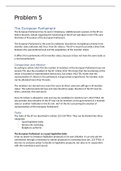Samenvatting
Summary Uitgebreide uitwerking van probleem 5 Introduction to International and European Law
Hierin vind je de uitgebreide uitwerkingen van de leerdoelen van probleem 5 van Introduction to International and European Law. Gebruikte boeken: - F. Amtenbrink & H. Vedder, European Union Law - Cases and Materials International and European Union Law
[Meer zien]




